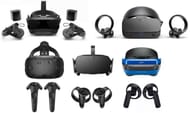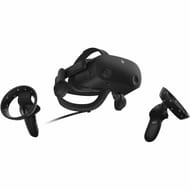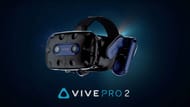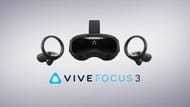VR headsets have come a long way since they went "mainstream" in the mid-2010's. Before Oculus was owned by Facebook and Valve had a stake in the VR market, users were always enticed by the concept of interacting with their games in the most immersive way possible.
The concept of VR itself has been around for ages and one of the biggest VR disappointments of the 90's, the Virtual Boy, stands testament to this fact. Today, more than two decades on and with leaps in technology, VR can truly become a household hobby.
Here's a look at the 5 best VR headsets for the PC market right now, considering different factors like price, comfort, quality and everything in between.
Looking for Crossword hints & solutions? Check out latest NYT Mini Crossword Answers, LA Times Crossword Answers, and Atlantic Crossword Answers
What to look for when buying VR headset
When it comes to products such as these, the trope of 'expensive is always better' doesn't hold up. VR headsets go far beyond the technical specs of the gear or tangible properties like build quality. Of course, the traditional specifications of field of view, display quality, refresh rates, etc can make or break a VR headset.
To truly make an informed decision regarding VR headsets, users must go beyond surface factors when considering a purchase. These include, but are not limited to: room space, headset lens adjustability, measures to tackle lens fog, budget for peripherals, expandibility and much more.
The second set of factors that buyers must consider is how much they want out of their headsets and how much they're willing to invest. For example, the Oculus Quest 2 is a brilliant piece of hardware that gives users 90% of the VR experience that the Valve Index does, but at 30% the price. For enthusiasts looking to take advantage of all the functionality that the Index's finger tracking technology and Base Stations provide, they're looking at a much higher price tag.
It is important to know the limitations of the product to avoid buyer's remorse.
The third set of factors that dictate a VR headset purchase are capabilities and comfort. A small room with less space to maneuver is more conducive to a wireless VR experience like the Oculus Quest 2 versus the wired setup of the Valve Index. Buyers may want to splurge on their headsets, but should be aware that they need space to use their setup optimally. The clamping force and weight of a headset are important things to consider when buying one as well.
Which VR headset is meant for me?

While there will never be a definitive answer as to which VR headset is the best, buyers can choose the right headset based on the above-mentioned factors. Whether it's for budget users or enthusiasts, the VR market has it all right now and here's a look at 5 great headsets each with their own strengths and weaknesses.
1. Oculus Quest 2 ($299 for 128 GB, $399 for 256 GB)

Specifications:-
Pros:
- Easy setup.
- All in one system that is truly wireless.
- Can be operated in small rooms without fear of cable entanglement.
- Starting at $299 for the 128 GB model, the Oculus Quest 2 provides immense value.
- Affordable accesories and adjustment options.
Cons:
- Forces users to use the Facebook ecosystem.
- Relatively short battery life.
2. Valve Index ($1000)

Specifications:-
Pros:
- Unmatched controllers: The Index controllers' finger tracking technology feels like the future of VR gaming in your palm.
- Steam VR Base Stations allow players to get full body tracking if they buy Vive trackers.
Cons:
- Completely wired, not built for smaller rooms.
- Heavy headset.
- Coming in at 1000$ for the base experience, the Valve Index is heaps more expensive than other VR headsets.
- Convoluted setup.
3. HP Reverb G2 ($599)

Specifications:-
Pros:
- Display resolution and quality that matches headsets that are double the price.
- Super lightweight chassis.
Cons:
- Subpar controllers.
- No support for refresh rates above 90Hz.
4. HTC Vive Pro 2 ($1,399)

Specifications:-
Pros:
- High refresh rate.
- Best display in the mainstream for clarity.
Cons:
- Wireless use requires further investment and lowers visual fidelity.
- Expensive.
- Mediocre controllers.
5. HTC Vive Focus 3 ($1,300)

Specifications:-
Pros:
- Best field of view in a standalone headset.
- No base stations required.
Cons:
- No access to Viveport marketplace.
- Expensive.
- Mediocre controllers.
The PC VR market has never seen such healthy competition in the past. Almost every VR headset out there today provides something that its competitors do not, be it value in terms of price, all-out display prowess or comfort. Which criteria matters most to a buyer will guide them to pick the right headset.
Are you stuck on today's Wordle? Our Wordle Solver will help you find the answer.
